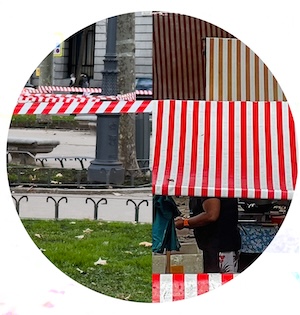In Fort Worth, three dismembered bodies were found
burning in a dumpster: a child, a woman, and a man.
I read it and went on with my day. A few days later,
a suspect confessed God told him to do it. He had
in-depth knowledge of the Bible, was called to
make a sacrifice. I spent my childhood believing
I was bad, contemplated at age six if I deserved
Heaven or Hell after I skipped a stone and hit
my mom in her eye. The human thing to do
is apologize for complete accidents hoping to
control the damage. Even decades later I’m sorry
for hurting my mom, still dealing with the shame
of being bad. In college I studied Aristotle and Kant
and Nietzsche and Heidegger and Foucault,
determined to know what makes a person good.
I was leaving a life and clinging to virtue.
In International Ethics, we read Machiavelli:
you treat people well or destroy them.
Safer to be feared than loved. When I teach
pathos we analyze politicians who tell us to “think
about the children.” When I was a kid, I’d cry
to end arguments. My 9th graders stay away
from logic and reasoning, they want to talk feelings
and opinions. One student chooses her research topic
on Ethics Theory, asks who really gets to decide what
makes a good or bad person. “Who gets to decide?” I say.
She says, “I don’t know if I can make up my mind.”
burning in a dumpster: a child, a woman, and a man.
I read it and went on with my day. A few days later,
a suspect confessed God told him to do it. He had
in-depth knowledge of the Bible, was called to
make a sacrifice. I spent my childhood believing
I was bad, contemplated at age six if I deserved
Heaven or Hell after I skipped a stone and hit
my mom in her eye. The human thing to do
is apologize for complete accidents hoping to
control the damage. Even decades later I’m sorry
for hurting my mom, still dealing with the shame
of being bad. In college I studied Aristotle and Kant
and Nietzsche and Heidegger and Foucault,
determined to know what makes a person good.
I was leaving a life and clinging to virtue.
In International Ethics, we read Machiavelli:
you treat people well or destroy them.
Safer to be feared than loved. When I teach
pathos we analyze politicians who tell us to “think
about the children.” When I was a kid, I’d cry
to end arguments. My 9th graders stay away
from logic and reasoning, they want to talk feelings
and opinions. One student chooses her research topic
on Ethics Theory, asks who really gets to decide what
makes a good or bad person. “Who gets to decide?” I say.
She says, “I don’t know if I can make up my mind.”
Sara Allison is a high school English teacher and poet. Her recent work appears in Little Stone Journal, The Minison Project, and Hidden Peak Press.
©2025 Volume Poetry
Join our mailing list:
Join our mailing list:
Follow us on instagram.
Submit your work to Volume:
submissions@volumepoetry.com
Submit your work to Volume:
submissions@volumepoetry.com
